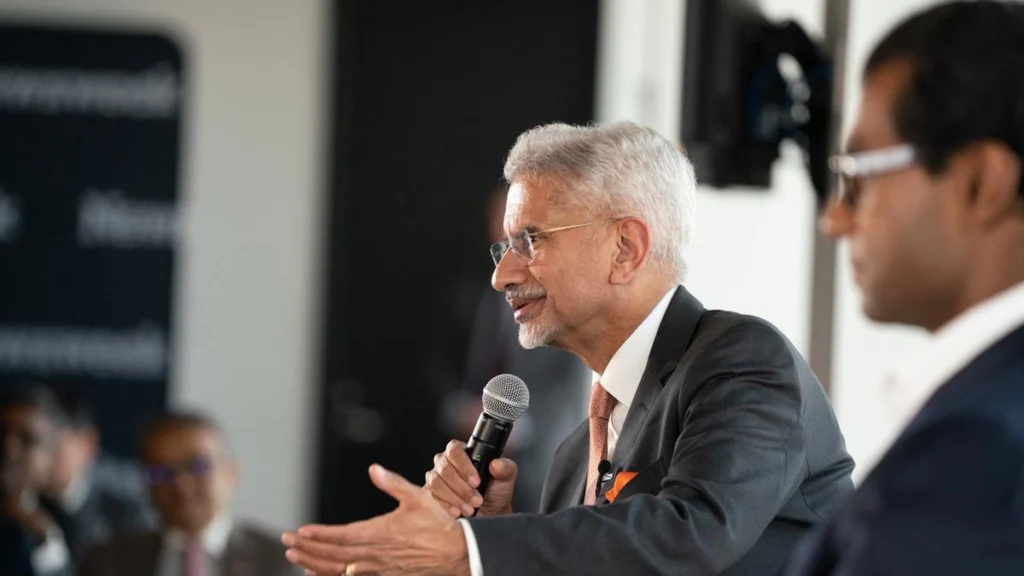Pahalgam attack was act of economic warfare, says External Affairs Minister Jaishankar

Pahalgam Attack Was an Act of Economic Warfare, Says External Affairs Minister Jaishankar
India’s External Affairs Minister, S. Jaishankar, recently described the Pahalgam terror attack as an act of economic warfare. He said the attack was designed to cripple Kashmir’s tourism industry. Jaishankar made these comments during his ongoing visit to the United States. His visit also included plans to attend the Quad Foreign Ministers’ Meeting in Washington, D.C. on July 1, 2025. Jaishankar emphasized that India would not tolerate nuclear blackmail or terrorism from Pakistan.
The Pahalgam attack, which took place in Kashmir, left several people dead and many more injured. The terrorists targeted civilians, and their attack disrupted the region’s economy, particularly tourism. Kashmir, known for its breathtaking landscapes, relies heavily on tourism. The tourism industry is essential for local businesses, such as hotels, guides, and transport services. Jaishankar’s statement underlined how such attacks seek to destroy the economic backbone of the region.
The Significance of Kashmir’s Tourism
Kashmir has long been a popular destination for tourists. Its scenic beauty, including lakes, mountains, and valleys, attracts visitors from all over the world. However, years of political instability and terrorism have severely impacted the tourism sector. Despite these challenges, tourism has remained an important part of Kashmir’s economy.
Jaishankar’s remarks pointed out that the attack in Pahalgam was a deliberate attempt to destroy this vital industry. He said that tourism is a critical source of income for local families. By targeting tourists and the businesses that support them, the terrorists sought to create fear and undermine economic stability. The attack was a reminder of the high price Kashmir pays for its ongoing conflict.
Jaishankar’s Statement on Economic Warfare
Minister Jaishankar called the Pahalgam attack a calculated attempt to harm Kashmir’s economy. He emphasized that such acts of terrorism are not just about violence—they have economic consequences. By undermining Kashmir’s economy, terrorists aim to destabilize the region and weaken its future prospects. Jaishankar made it clear that India would not be intimidated by these attempts. He reiterated that India’s response to terrorism, especially when it comes from Pakistan, will remain firm and unwavering.
Jaishankar also touched on the broader issue of nuclear blackmail. He stated that India would not allow nuclear threats to prevent it from taking strong actions against terrorism. This statement comes amid growing concerns over Pakistan’s nuclear capabilities and its continued support for terror groups operating from its soil. Jaishankar’s comments aimed to send a clear message: India will respond to terrorism, no matter the threat.
India’s Fight Against Terrorism
The Pahalgam attack adds to a long list of terror incidents that have originated from Pakistan. Over the years, Pakistan has faced growing international criticism for allegedly supporting and harboring terrorist groups. India has repeatedly called on the international community to hold Pakistan accountable for its role in perpetuating terrorism in the region. Jaishankar’s statement reflects India’s continued stance on the issue.
India has taken steps to strengthen its security measures and counter-terrorism operations. The government has also emphasized the need for stronger international cooperation in fighting terrorism. Jaishankar pointed out that the fight against terrorism requires a global effort. While India continues to strengthen its security, it also seeks greater cooperation from other nations in addressing cross-border terrorism.
The Role of the Quad
Jaishankar’s visit to the United States was part of broader efforts to strengthen India’s international relationships. As part of the Quad—a strategic forum comprising the United States, Japan, Australia, and India—Jaishankar has been working on advancing collective efforts to ensure regional security. The Quad nations have shared concerns about terrorism and have worked together to address common security challenges in the Indo-Pacific region.
The upcoming Quad Foreign Ministers’ Meeting will provide a platform for Jaishankar and his counterparts to discuss pressing issues, including terrorism, trade, and regional security. Jaishankar’s comments on the Pahalgam attack highlight the importance of global cooperation in countering terrorism. The Quad’s collective efforts are crucial in promoting stability and addressing the challenges posed by terrorism in South Asia.
Nuclear Blackmail and Pakistan
Jaishankar’s mention of nuclear blackmail reflects the longstanding concerns that India has regarding Pakistan’s nuclear capabilities. Pakistan has maintained a policy of using its nuclear arsenal as a deterrent against India. However, Jaishankar made it clear that India will not be deterred by such threats when it comes to combating terrorism. India’s message is that it will continue to take firm actions against terrorism, regardless of Pakistan’s nuclear posture.
India’s stance on nuclear blackmail underscores the complexity of the relationship between the two nations. While both countries have nuclear weapons, India has consistently emphasized that the use of nuclear weapons for political leverage will not stop it from taking necessary actions against terrorism. Jaishankar’s comments reaffirm India’s resolve to protect its citizens and respond effectively to security threats.
Conclusion
The Pahalgam terror attack serves as a stark reminder of the ongoing challenges India faces in its fight against terrorism. Jaishankar’s comments about economic warfare and nuclear blackmail highlight the broader strategic context of the situation. India remains committed to responding firmly to acts of terrorism, regardless of the challenges posed by neighboring Pakistan.
As Jaishankar continues his diplomatic efforts, both in the United States and with the Quad nations, the global community remains focused on India’s response to terrorism. The fight against terrorism, especially terrorism that emanates from Pakistan, will continue to shape India’s security policies in the years to come. Through strategic partnerships, stronger security measures, and international cooperation, India seeks to ensure that such attacks do not deter its progress and its efforts to promote peace and stability in the region.






